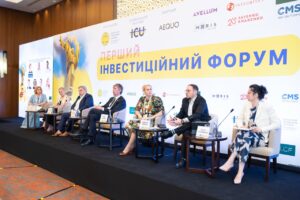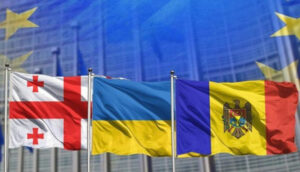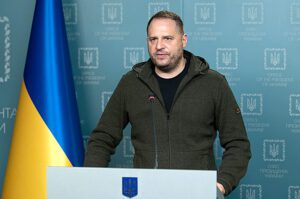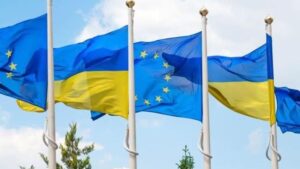
On June 6-7, 2024, the Ukrainian Bar Association held the First Investment Forum. For two days, this event was a platform for discussing promising investment opportunities and solving legal challenges in areas that are important for the further sustainable development of Ukraine.
The first day of the Forum was held online. The event was opened by Mykola Stetsenko, President of the UBA, Managing Partner of AVELLUM. In his welcoming remarks, he expressed confidence that the discussion at the Forum would be useful, contribute to business projects and ideas, and improve foreign investors’ understanding of the business environment in Ukraine.
Andy Hunder, President of the American Chamber of Commerce in Ukraine, also greeted the Forum participants. He noted that foreign businesses continue to operate in Ukraine and support it in the face of a full-scale Russian invasion.
Makar Paseniuk, founding partner of ICU Group, in his welcoming speech expressed the opinion that the First Investment Forum is unique and interesting. He emphasized that finance and investment are impossible without the work of lawyers. “We are interconnected and I think we will be even more interconnected,” added Mr. Paseniuk.
The founding partner of ICU Group also urged the Forum participants to be inspired by the ideas to be discussed at the event.
The first session of the first day of the Forum was titled “Helicopter view: investment climate in Ukraine”. The discussion was moderated by Olga Fedosova, Partner at White&Case (Paris, France). She noted that the discussion would focus on the investment climate in Ukraine and the challenges facing investors. Ms. Fedosova emphasized that despite the full-scale war, the Ukrainian economy is recovering and developing.
Marlena Hurley, Managing Director of Political Risk Insurance and Reinsurance at the International Development Finance Corporation (USA), noted the resilience of Ukrainian business amid the war. She emphasized that her organization is doing everything possible to support key sectors of the Ukrainian economy. Ms. Hurley noted that the corporation offers a function to cover the costs caused by Russian aggression against Ukraine.
Bozhidar Celek, Managing Director and Head of Lazard Central and Eastern Europe, CIS and Turkey, said that the best investors in Ukraine are those businesses that are already in Ukraine, so working with them will bring the greatest success. The expert also believes that it is necessary to work on a separate business insurance in times of war.
According to Mr. Dzhelik, foreign investors tend to rely on those who make technological and environmental assessments on site, so Ukraine should develop this capacity.
Makar Paseniuk, founding partner of ICU Group, stated that most deals in Ukraine are currently being made by local rather than foreign companies. In his opinion, post-war investment in Ukraine will be associated with great risk, so at the first stage it will be mostly adventurers.
Speaking about the attractiveness of investing in Ukraine in the current environment, Mr. Paseniuk noted that only a large, attractive product can change the situation. As an example, he cited green energy, which has attracted $12 billion in investments to Ukraine.
Stefan Weiler, Head of Debt Capital Markets for Central and Eastern Europe, Middle East and Africa at J.P. Morgan, spoke about the project to create a fund for the post-war reconstruction of Ukraine. J.P. Morgan and the investment company BlackRock are helping the Ukrainian government to create this fund.
Patricia Shaughnessy, Professor at Stockholm University, emphasized the importance of Ukraine’s cooperation with the international community to increase the country’s investment attractiveness.
The presentation of the report “Opening Up Investment in Ukraine”, which is the result of joint work of the British Institute of International and Comparative Law and the Ministry of Justice of the United Kingdom, followed.
The report was presented:
The project included:
The final report of the project contains key recommendations on steps Ukraine can take to improve its commercial dispute resolution system, including completion of ongoing reforms, capacity building measures, and establishment of new institutions.
The first day of the Forum concluded with a discussion on common myths about doing business in Ukraine. The session was moderated by Daniel Cousins, Corporate Partner at Linklaters (Warsaw, Poland).
The panelists discussed regulatory obstacles to business, currency restrictions, how the war is affecting business in practice, etc.
Anna Babych, Executive Partner at AEQUO, shared information on the latest legal changes that may affect the investment climate in Ukraine. In particular, she spoke about the instruments used by the Ukrainian government to support and stimulate investment during a full-scale war. Among the latest positive developments in this area, Ms. Babych mentioned amendments to the law on state support for investment projects with significant investments, the adoption of a law on investment insurance against war risks, and the easing of currency restrictions by the National Bank of Ukraine, including permission to repatriate “new” dividends.
Mykola Stetsenko, President of the Ukrainian Bar Association, Managing Partner of AVELLUM, familiarized the Forum audience with Ukraine’s achievements in the fight against corruption. He spoke about the formation of Ukraine’s anti-corruption infrastructure – NABU, NAPC, SAPO, HACC – and its recent successes and achievements. Among the achievements in the field of corruption prevention, Mr. Stetsenko mentioned:
The experts also paid attention to the judicial system. Olena Kibenko, a judge of the Commercial Court of Cassation of the Supreme Court, provided statistics on the average duration of commercial litigation in 2023:
According to Ms. Kibenko, last year commercial courts of first instance issued 127,974 decisions, of which 23,099 (18%) were appealed, and 9,183 (7%) were appealed in cassation. In 16% of cases, the Supreme Court overturned the decisions of the first instance courts and returned the cases for reconsideration.
Volodymyr Sayenko, partner at SAYENKO KHARENKO, and Tatyana Dovgan, partner at CMS Cameron McKenna Nabarro Olswang’s Kyiv office, also took part in the discussion.
The second day of the First Investment Forum was held at the Hilton Kyiv Hotel.
Mykola Stetsenko, President of the Ukrainian Bar Association, Managing Partner of AVELLUM, in his welcoming speech thanked the participants of the first day of the Forum. He also expressed gratitude to the military who are now defending Ukraine from the Russian invasion. The participants of the event observed a minute of silence in memory of those who fell for the freedom and independence of Ukraine.
Mr. Stetsenko noted that the second day of the Forum will focus on best practices in the investment industry. The President of the UBA expressed hope for a fruitful discussion and emphasized the importance of the dialogue between lawyers and business. Mr. Stetsenko said that the Forum will result in a memorandum with the results of each session and relevant recommendations.
The Forum participants were also greeted by Liudmyla Yenina, Director of the Economic Diplomacy Department of the Ministry of Foreign Affairs of Ukraine. She promised that diplomats would do their best to support Ukrainian businesses that continue to operate in the midst of a full-scale war.
Ms. Yenina emphasized the importance of attracting investment and harmonizing Ukrainian legislation with EU legislation. It is necessary to create new platforms and attract private investors, including foreign ones, the diplomat emphasized.
The Foreign Ministry representative spoke about the economic diplomacy tools used by the Ukrainian government to support business, including support for exporters.
The first session of the second day of the Forum was entitled “Ukraine’s Accession to the European Union: What Does It Mean for Business?”. The discussion was moderated by Anzhela Makhinova, Partner of International Trade Practice at SAYENKO KHARENKO. She noted that the discussion would focus on the issues of Ukraine’s European integration from the business perspective, in particular procedural issues. Ms. Makhinova also suggested discussing how open the EU market is for Ukrainian business.
Oleksiy Ryabchyn, Advisor to the Vice Prime Minister for European and Euro-Atlantic Integration of Ukraine, noted that the conditional benchmark for Ukraine’s accession to the EU is 2030. According to him, by that time the country should have gone through the process of adapting its national legislation to the European one. The difficulty lies in the fact that the adaptation of Ukrainian legislation to EU law is a dynamic process that is ongoing. For example, after this year’s elections, the new European Parliament will adopt new laws that Ukraine will also need to adapt to, Mr. Ryabchyn emphasized.
The advisor to the Vice Prime Minister also outlined the nuances of government and business interaction in the process of Ukraine’s European integration, including how businesses can defend their interests in this process.
Inna Khomych, Chief Legal Officer of Nova Poshta Group, noted that despite the difficult military conditions, Nova Poshta continues to develop its business, including opening 5 sorting terminals during the full-scale war.
Ms. Khomych also shared the company’s experience in expanding its business in the EU. Thus, NOVA Group has already entered the markets of 13 European countries. At the same time, the speaker expressed the opinion that the EU is “not very happy” to have a new competitor in the face of Ukrainian business. She spoke about the difficulties and obstacles, primarily bureaucratic ones, that NOVA faces in the European market.
Businesses need to unite to effectively communicate their views to both the Ukrainian government and EU institutions, emphasized Inna Khomych.
Opportunities and challenges for exporting Ukrainian products to the EU, imports of goods from the EU to Ukraine, and other business aspects of Ukraine’s European integration were also discussed:
The second session of the Forum was titled “Reforms in Time of War – What Working Conditions Should Business Expect?”. The discussion was moderated by Andriy Reun, partner at LCF Law Group.
One of the topics of discussion was the incentives and expectations of businesses investing in Ukraine in the context of a full-scale war. The speakers discussed, among other things, the problem of pressure from government institutions, the lack of effective dialogue between business and the state, and corruption risks in their relations.
In particular, Oksana Myronko, Head of Communications at the European Business Association, and Roman Vashchuk, Business Ombudsman, shared their thoughts on this issue. Mr. Vashchuk also said that the Business Ombudsman Council has prepared a declaration on fair and reasonable administration, which contains 12 points.
Oleh Hetman, Coordinator of Expert Groups at the Economic Expert Platform, Member of the Supervisory Board of the Ukrainian Business Council, focused on the new taxation system proposed by the Ministry of Finance of Ukraine in the high-profile National Revenue Strategy for 2024-2030 (NRS). According to the speaker, experts have analyzed the NDS and expressed their comments, which were passed on to the government. He reminded that the Ministry of Finance developed the strategy without any consultations with the public and business.
Mr. Hetman believes that the strategy should not be implemented under any circumstances, as its implementation will worsen the investment climate in Ukraine. He called on business, lawyers and other stakeholders to unite and make efforts to ensure that the NIS remains only on paper.
Artem Yarmola, Deputy Director of Legal Department at FOZZY GROUP, shared his thoughts on whether customs reforms will simplify business. Among other things, he emphasized the need to punish unscrupulous businesses for violating customs rules.
Oleksandr Kryzhanivskyi, Director of Universal Insurance Brokers and Consultants LLC, spoke about the prospects for insurance against military and political risks in Ukraine and opportunities for foreign and national investors in this area.
Ivanna Smachylo, Deputy Head of the State Property Fund of Ukraine, outlined privatization issues in her report. She noted that Ukrainian business is mainly interested in acquiring property complexes, production facilities, etc., while foreign investors are interested in large-scale privatization. The speaker added that in the summer of 2024, “large-scale privatization will be a priority.”
Ms. Smachylo also said that in July this year, the first 108 hectares of state land will be put up for sale on Prozorro.Sale.
In between the sessions, a presentation of the book “Unbreakable Business” dedicated to the work of Ukrainian business during the war was held. The co-authors of the book are Oleksandr Holizdra, beneficiary of the Market.Info communication agency, chairman of the committee of the Public Council at the Bucha District State Administration, and Serhiy Shevchenko, director of the Market.Info communication agency.
Presenting the book, Mr. Shevchenko said: “This book is a chronicle of Ukrainian business during the war. It contains the exceptional experience of companies in strategically important industries: energy, pharmaceuticals, banking, and food. Everyone knows the brands and market leaders.”
The book describes the general priorities of Ukrainian business during the war, work planning and strategy changes, unique cases and emotional stories. The book is available for purchase on the website of the Summit Book publishing house.
The First Investment Forum was then held in the format of parallel sessions dedicated to specific sectors of the Ukrainian economy.
Thus, the participants of the session “Challenges and Opportunities in the Agricultural Sector” discussed investments in the agricultural sector. The panel was moderated by Marian Martyniuk, Senior Partner at MORIS.
The following issues were proposed for discussion:
The experts shared their views on the challenges and opportunities that currently exist in the Ukrainian agricultural sector. In particular, Mykola Gorbachev, President of the Ukrainian Grain Association (UGA), said: “Farmers continue to work. However, the most pressing challenge is that 6 million hectares are mined. Tragedies often occur. It takes more than 700 years to clear the mines. And demining will not happen without business.”
According to Mr. Gorbachev, it is business that will bring solutions and technologies, and it will be attractive for investment thanks to programs and compensation from the state. “Only in this way will we be able to overcome the problem of demining our land,” summarized the UGA President.
This idea was continued by Viktor Dovgan, Deputy Minister of Infrastructure of Ukraine in 2016-2019, Advisor to the Upper Silesian FGSA Foundation. He stated that the most pressing issues now are export logistics.
“The best investor in agricultural export logistics is the Armed Forces of Ukraine. When we gained control of our part of the Black Sea, we immediately received 50 million tons of exports through the ports,” Mr. Dovgan said.
According to him, the state understands the need for investment, and many mechanisms are being prepared to compensate for investments in infrastructure, industrial park models, and road development. Obviously, the energy sector will require the most investment, but Ukrzaliznytsia’s track logistics projects are already needed, and we also need to think about air logistics when the sky is opened, Viktor Dovhan emphasized. He added that these projects are an element of Ukraine’s European integration.
The topic of investing in the agricultural sector was continued by Yuriy Kozak, Director of Large Corporate Clients Department at Raiffeisen Bank. “Agriculture is the main source of foreign exchange for the country. This sector has shown resilience and adaptability the most. At the beginning of the war, banks had to survive, but today we have to think about investing. For example, in new production, in agro-processing plants, in investments and small generating capacities for the agricultural sector,” the speaker noted.
Oleksiy Rashchupkin, managing partner at Altius Capital, noted that 90% of investments in the agricultural sector are domestic investments. According to him, this is due to an important issue in the land market: the specifics of Ukrainian agriculture are leased land, not owned. This is a very incomprehensible instrument for foreign investors, which is why Ukraine lacks large capital investments in this area, Mr. Rashchupkin explained.
In general, the participants agreed that the challenges also point to huge opportunities for investment in the Ukrainian agricultural sector.
Another parallel session of the Forum was devoted to the challenges and opportunities in the field of natural resources extraction. The session was moderated by Maksym Maksymenko, AVELLUM Partner, Head of Real Estate and Infrastructure Practice.
The discussion was attended by:
The speakers discussed, among other things, the recovery of the extractive industry amid a full-scale war and state support for mining. In particular, Yulia Lushpienko and Mykola Kolisnyk discussed the possibility of creating industrial parks for the extractive industry.
Svitlana Romanova spoke about the challenges and opportunities in the field of natural resource extraction. In particular, according to her, these are:
According to Ms. Romanova, Ukrainian business has demonstrated the ability to adapt to extremely difficult conditions, but unfortunately, national legislation is not as flexible.
Yulia Borzhemska delivered a report on “Current regulatory issues in the oil and gas industry”. Among other things, she discussed the implementation of production sharing agreements, current issues of the natural gas market (timing of REMIT implementation, etc.).
“Challenges and opportunities in the energy sector” was the topic of another parallel session of the First Investment Forum. The discussion was moderated by Oleksiy Feliv, Managing Partner at INTEGRITES.
Volodymyr Kudrytskyi, Chairman of the Board of NPC Ukrenergo, said that due to intense attacks on power plants by Russian terrorists, Ukraine is forced to switch from traditional to green generation. “What should replace thermal generation? The generation mix should include highly maneuverable gases, wind and solar, biomass and biogas technologies,” the speaker said.
Speaking about the role of the state in the energy sector, Mr. Kudrytskyi called for refraining from obstruction, additional regulation and the creation of additional state institutions. “The state should complete a set of regulatory packages and contracts and clearly define the rules of credit financing,” added the Chairman of the Board of NPC Ukrenergo.
Olha Kovalchuk, Head of Finance and Investment at Goldbeck Solar, a solar generation giant that entered Ukraine during the war, shared her international experience: “Projects and investments should be guaranteed by insurance projects. There must be appropriate financial structuring and resolution of the issue of corporate power purchase agreements (PPAs). It is very important to amend the Law on State Support for Investment, which should include renewable energy.”
Oleksandr Podprugin, Regional Manager of Notus Energy, a German developer of generation plants, emphasized the main obstacles and limitations of scalable investment projects:
At the same time, he emphasized the readiness of companies to invest and stressed the need to work more intensively with international financial institutions to resolve investment issues.
Yaroslav Kryl, CEO of Hydrogen of Ukraine LLC, focused on the need to create entire ecosystems for the development of hydrogen projects. He shared his experience in attracting grant projects and creating consortia with international institutions. The speaker also shared his thoughts on the study of hydrogen and salt deposits in the subsoil of Ukraine.
In conclusion, moderator Oleksiy Feliv noted that, unfortunately, due to the full-scale war, Ukraine is forced to make great technological leaps, but this is already being done for our civilized future.
The fourth parallel session of the Forum was devoted to the challenges and opportunities in the defense sector. The discussion was moderated by Mykhailo Lukashenko, Partner at AEQUO.
The panelists shared their views on the following issues:
The experts of the session were:
For a photo report from the First Investment Forum, please follow the link.
The Ukrainian Bar Association is grateful for the support in organizing the event:
Interfax-Ukraine news partner
EUROPEAN INTEGRATION, INVESTMENT CLIMATE, INVESTMENT FORUM, REFORMS, UBA

Brussels will continue to support Moldova, Ukraine and Georgia in carrying out pro-European reforms, according to a statement issued on Friday following the EU summit.
“The European Union will continue to work closely with Ukraine, Moldova and Georgia and support their reform efforts on their European path,” it said.
The statement says that the meeting also decided that Brussels will support Moldova in addressing the challenges it faces due to the events in Ukraine.
Last March, Georgia applied for EU membership, but has not yet been granted candidate status.
In February 2022, Ukrainian President Volodymyr Zelenskyy signed Ukraine’s application for EU membership. In June of the same year, the EU Council granted Ukraine candidate status.
In June 2022, Moldova was also granted candidate status.

Head of the Office of the President of Ukraine Andriy Yermak said that judicial reform remains one of the necessary ones for joining the EU.
“Judicial reform, a mechanism for selecting judges and holding them accountable,” he said, speaking at a Forbes-Ukraine conference on Friday.
Among the necessary reforms, he also named the reform of the SBU. “We must also continue to implement a plan to de-oligarchize Ukraine in order to eliminate the influence of the oligarchs on political decision-making,” he said. At the same time, he stressed the need for a significant strengthening of the antimonopoly legislation.
Yermak also announced the reform of key ministries and departments. “The state should become more compact and efficient,” he said.
The main principles for the authorities, according to him, remain “security standards, the rule of law, the value of human life.”
“Joining the EU will help us build a Ukraine that we can be proud of,” Yermak said, noting that “this (joining the EU-IF-U) should take place “as soon as possible.”
He also considers it necessary to develop practices for creating industrial parks and special regimes for IT companies.
Yermak urged businessmen to “be more active in making proposals and cooperating with the government and the President’s Office.” “The government, together with experts, should create a national plan for joining the EU. The plan should be as realistic as possible,” the head of the President’s Office said.

Germany is ready to hold a conference on reforms in Ukraine in 2024, German Minister for Economic Cooperation and Development Svenja Schulze said.
“The restoration of a free and democratic Ukraine is our joint goal. Recovery and reforms are elements of what will be a strategic task for the coming years. Therefore, Germany will also host an international expert conference on reconstruction issues. Germany is also ready to host a conference on reforms in Ukraine in 2024 “, she said at the International Conference on the Reconstruction of Ukraine in Lugano (Switzerland) on Tuesday.
Schulze emphasized that the platform for the restoration of Ukraine should unite the Ukrainian government, all international partners and experts.
In addition, the minister stated that her government is committed to providing grants in the amount of EUR426 million in direct support to Ukraine.

Ukraine’s anti-money laundering legislation partially complies with the standards of the Financial Action Task Force (FATF) and international legislation, but the recommendations of the Council of Europe’s Committee of Experts on the Evaluation of Money Laundering Measures (Moneyval) still remain unfulfilled , says the European Commission.
“Further reforms are needed to improve Ukraine’s compliance with FATF standards, in particular those relating to virtual assets, ultimate beneficial ownership and supervision of non-banking enterprises and transactions,” the European Commission’s Opinion on Ukraine’s application for membership in the European Union states.
It states that for these reasons, Ukraine is still reporting to Moneyval in accordance with the enhanced control procedure.
The European Commission also pointed to the need for more progress in investigating and prosecuting major money laundering schemes.
“Establishing a comprehensive framework for combating financial crime and money laundering and ensuring its effective implementation is critical to addressing the significant risks they pose,” the Opinion notes.
With regard to the established National Agency of Ukraine for the identification, search and management of assets obtained from corruption and other crimes (ARMA), it is indicated that since the end of 2019 it has not had a permanent head.
“Legislation regarding the management of seized assets should be improved and an appropriate national strategy for the return of assets should be adopted,” the European Commission believes.

U.S. Secretary of State Antony Blinken has named five ways the Ukrainian government can develop the progress made and where the United States is ready to help Ukraine.
First. To adopt the draft law on reforming the High Council of Justice, followed by the law on the High Qualifications Commission of Judges. Together, these laws will ensure a transparent process for the selection of judges. Second. To ensure that the selection of the leadership of the National Anti-Corruption Bureau and the Specialized Anti-Corruption Prosecutor’s Office is transparent, credible and based on merit, Blinken said in a video message to participants of the Ukraine Reform Conference, which is taking place in Vilnius on Wednesday.
According to him, the third step is to pass a law on transparent corporate governance, which protects the independence of the supervisory board, CEOs and complies with the standards of the Organisation for Economic Co-operation and Development (OECD).
Blinken called the fourth step the adoption of legislation that demilitarizes, depoliticizes the Security Service of Ukraine, and leaves the work of combating corruption and combating organized crime to other government institutions created for this purpose.
And fifth. Bring corrupt officials to justice. A number of investigations have been carried out, but no senior official has been tried or convicted of corruption since 2014. People need to see that the system is working in order to believe in it, the Secretary of State said.